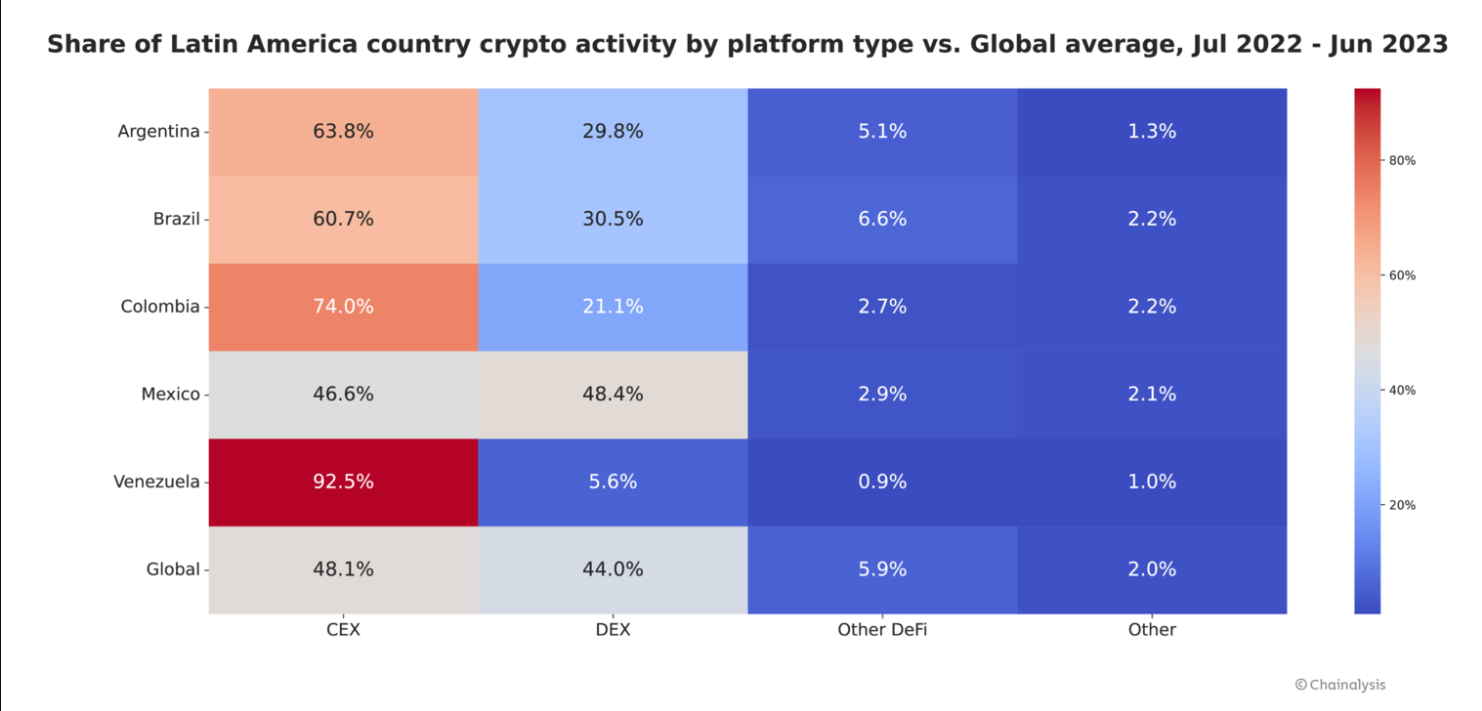16 Oct 2023 Jane Whitmoore
Latin America Turns To Cryptos In Time Of Economic Crisis
Argentina has seen significant currency devaluations, which have harmed individuals' capacity to save and made day-to-day financial activities challenging. Sadly, Argentina is going through another one of these cycles right now, as the value of the Argentinian peso dropped by almost 51.6% in the year before July 2023.
Argentina, however, ranks second in the area for grassroots adoption during that same time span and tops Latin America in terms of raw transaction volume with an estimated $85.4 billion in value received, according to a new report from blockchain intelligence company Chainalysis.
The main reason for acceptance in the nation, according to Chainalysis, is the protection that cryptocurrencies can offer common citizens against the Argentine peso's depreciation.
"Our country has very significant inflation, and purchasing foreign currency is subject to several limitations. Crypto is now a good choice for saving as a result," Alfonso Martel Seward, Head of Compliance & AML at Argentina-based cryptocurrency exchange Lemon Cash
According to Martel Seward, stablecoins in particular are well-liked for this use case and offer a fresh approach to satisfying persistent local demand for the U.S. dollar. Any Argentine will be able to tell you how many pesos are in a dollar if you approach them and ask, according to Martel Seward. As the use of cryptocurrencies has increased, many people in this country now deposit their paychecks directly into USDT or USDC.
The Chainalysis report shows that cryptocurrency purchases increased as the Argentine peso steadily depreciated, reaching a peak in mid-April, just as Argentina's inflation rate reached 100% for the first time in three decades. Additionally, there was a little decline in cryptocurrency purchases beginning in September, just as the peso's value steadied.
Venezuela has had a significant currency devaluation and more than its fair share of economic issues, much like Argentina. Venezuela, however, has a significant distinction from Argentina in that it is run by an authoritarian regime. Venezuelans live with serious human rights violations, political repression, and a lack of opportunity as a result of government corruption, which includes theft from the nation's state-owned oil corporation.
Latin America prefers centralized exchanges
In contrast to the rest of the globe, Latin America has a preference for centralized exchanges (CEXs) over decentralized exchanges (DEXs), Chainalysis added.
According to the October 11 research paper, Chainalysis ranked Latin America after the Middle East and North America (MENA), Eastern Asia, and Eastern Europe, as the region has the seventh-largest crypto economy worldwide.
“Latin America shows the highest preference for centralized exchanges of any region we study, and tilts slightly away from institutional activity compared to other regions.“ Chainalysis wrote
Additionally, relative to the worldwide average, the distribution of crypto activity by platform type is markedly skewed toward CEXs in some nations within the area.

Source: Chainalysis
The average preference for cryptocurrency platforms around the globe is 48.1% for CEXs, 44% for DEXs, and 5.9% for other DeFi (Decentralized Finance) activities.
However, in Venezuela, the choice for CEXs is much larger at 92.5%, while the desire for DEXs is much lower at 5.6%.
Chainalysis emphasized that Venezuela has a special explanation for its rising adoption rates, which is mostly related to a "complex humanitarian emergency."
According to the paper, cryptocurrency was crucial in directly supporting healthcare experts across the nation during the COVID-19 epidemic in 2020.
As a result, crypto became essential because regular payments were challenging due to the government's political-influenced refusal to accept outside aid.
However, Colombia displays a 74% preference for CEXs whereas only 21.1% of their preferences are for DEXs.
Argentina, with an estimated $85.4 billion in Bitcoin transactions during the calendar year that ended on July 1, leads Latin America in terms of sheer volume.
In order to lessen the country's payment system's vulnerability to digital assets, Argentina's central bank on May 5 prohibited payment providers from offering cryptocurrency transactions.
According to the monetary authority, this was done in order to hold fintech companies in Argentina to the same standards as traditional financial institutions.
On Chainalysis' Global Crypto Adoption Index, three Latin American nations earned spots among the top 20. In ninth place is Brazil, followed by Argentina in 15th and Mexico in 16th. India came in first, followed by Vietnam in second place and Nigeria in third.
Cryptocurrency exchange Exchanges News cryptocurrency news decentralization dex crypto news Decentralized Exchange





























